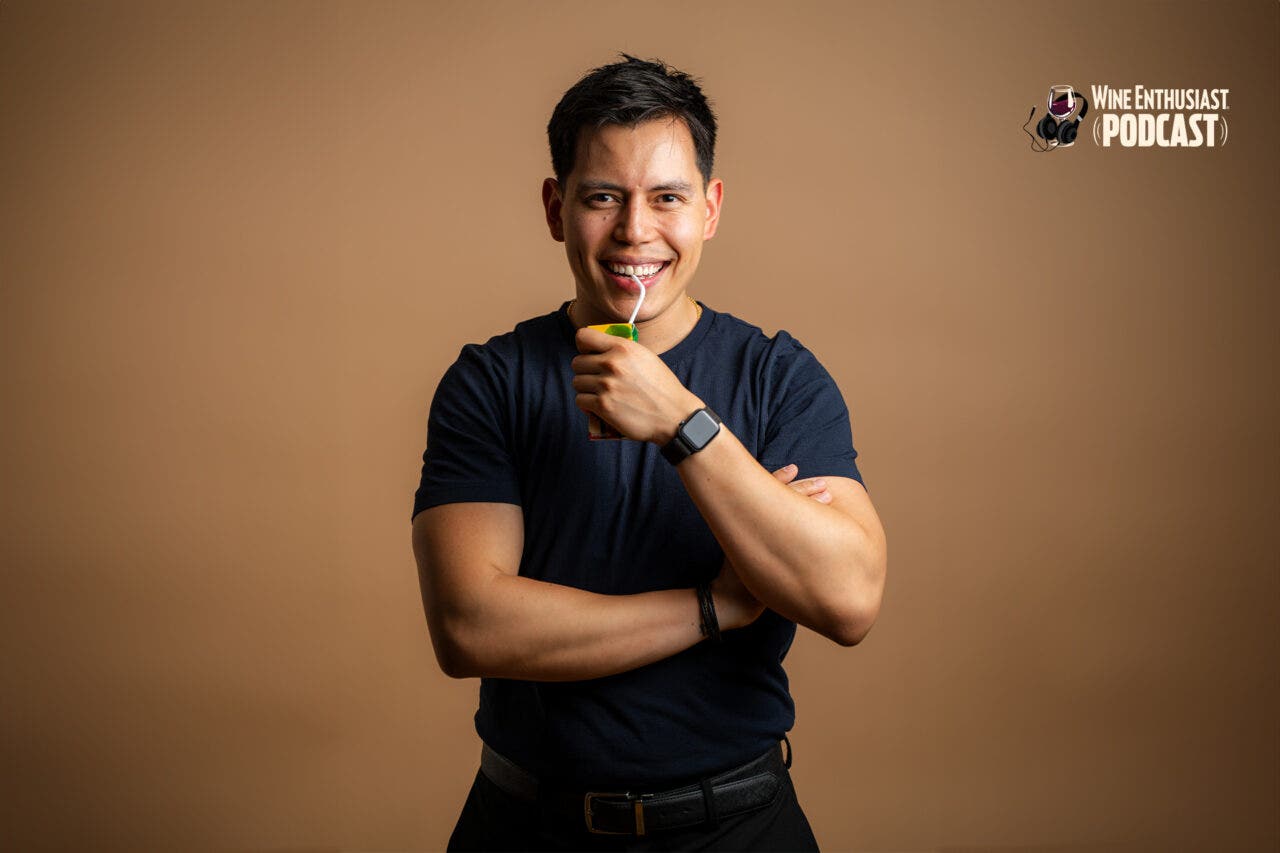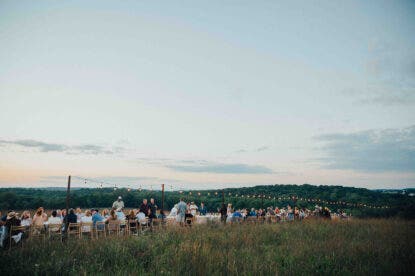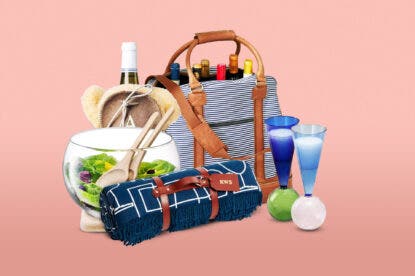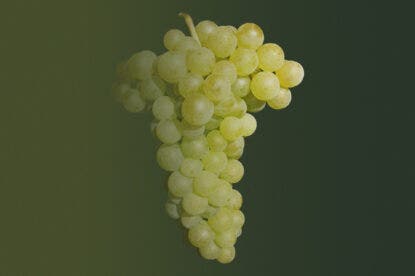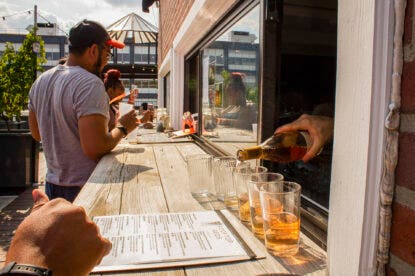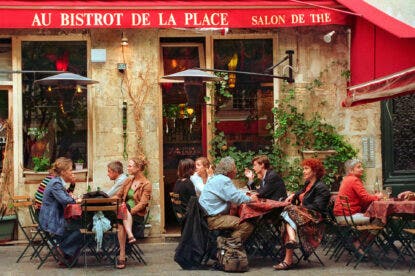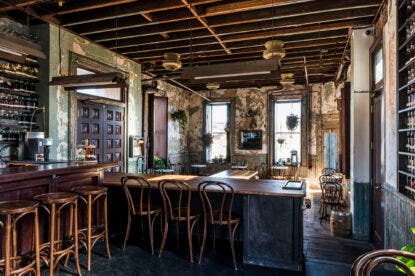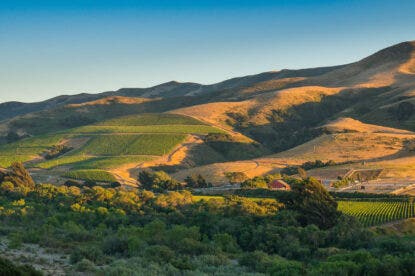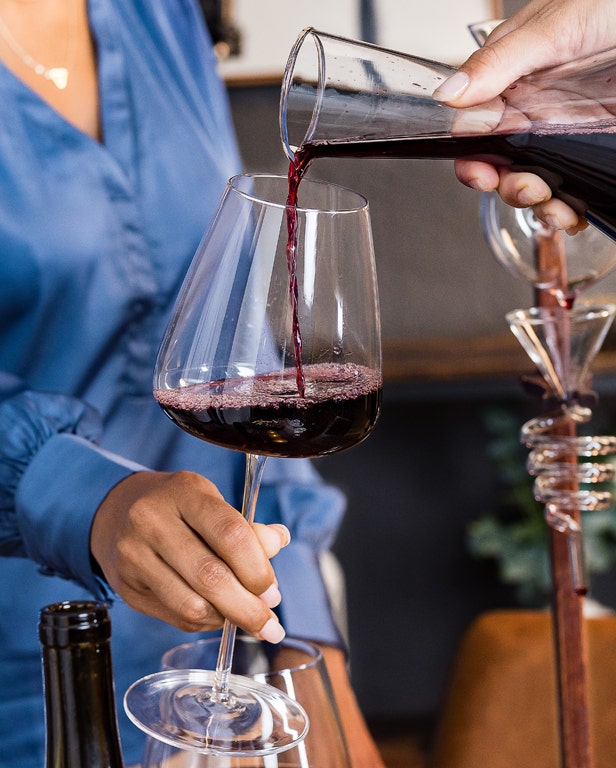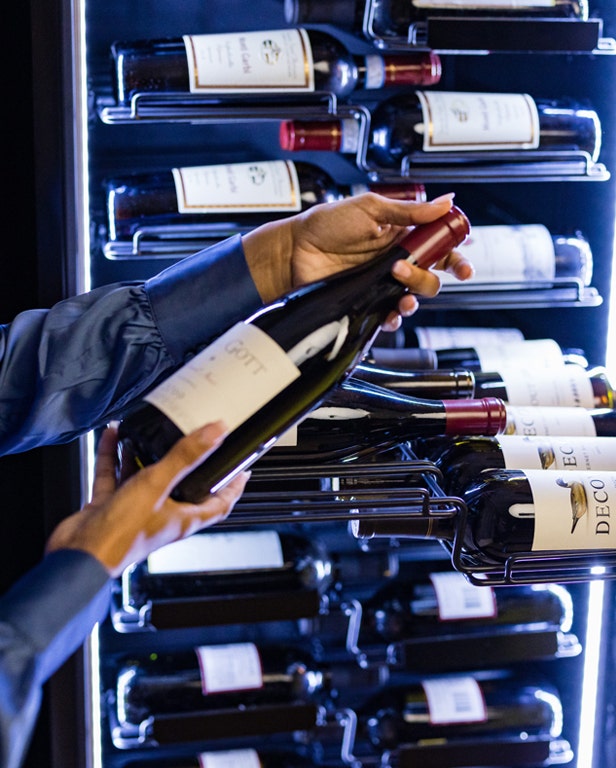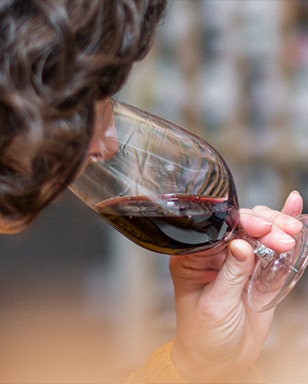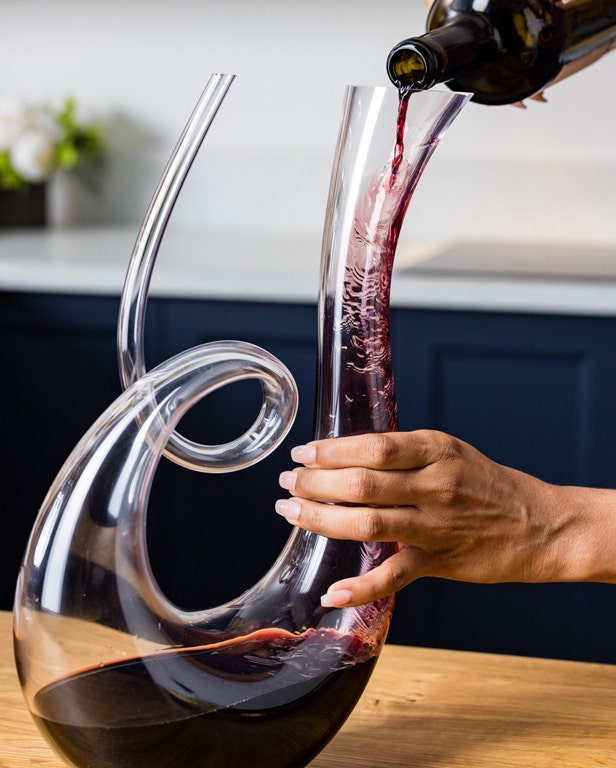Anna-Christina Cabrales, Tasting Director at Wine Enthusiast, delves into the world of sobriety in the wine industry with guest Abe Zarate, known as @sober_somm on Instagram. Together, they examine sobriety and explore the idea of enjoying wine culture while abstaining from alcohol, emphasizing that being “sober” can mean different things for different people.
Zarate, a charismatic and talented NYC sommelier at The Modern, shares his journey transitioning from a career in music publishing to the wine industry and, eventually, embracing sobriety. He challenges common misconceptions, stressing that being sober does not necessarily mean complete abstinence but rather a sustainable lifestyle.
You May Also Like: What Happens When a Sommelier Stops Drinking?
Acknowledging the growing prevalence of sobriety, Zarate highlights the importance of defining boundaries and finding balance. He explains how he continues to actively participate in wine culture through tasting, despite not ingesting alcohol, a connection that, he says, keeps him engaged. Building off this idea, Zarate offers practical tips for aspiring sober sommeliers, such as building a supportive community, setting boundaries and normalizing the use of spittoons—all things that have helped him grow and conquer uncomfortable emotions and situations.
The conversation also touches on cultural influences on flavor profiles, with Zarate and Cabrales bonding over familiar flavors from their respective Mexican and Filipino heritages. From tamarind to ancho chile, they draw parallels between traditional flavors and where they appear in certain wine profiles, showcasing the diversity and richness of what wine can embrace.
Tune into this episode to learn valuable insights on navigating sobriety in the wine industry, as well as the importance of being inclusive and understanding to all who contribute to the magic of wine.
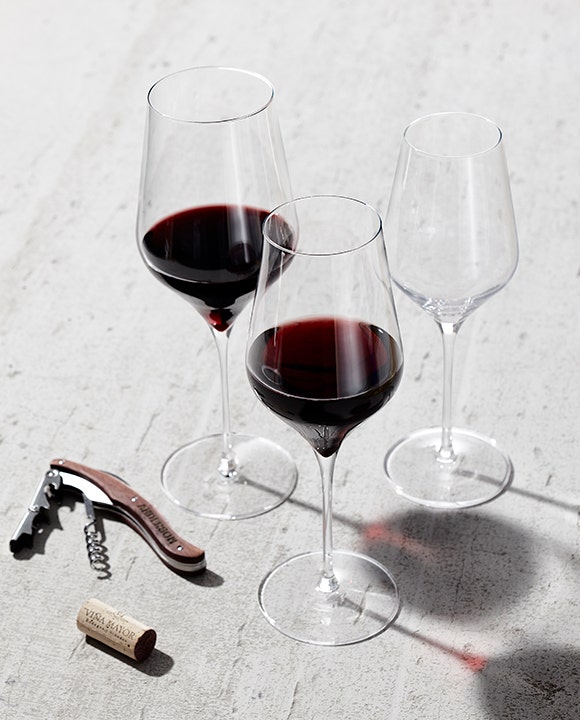
From the Shop
Find Your Wine a Home
Our selection of wine glasses is the best way to enjoy the wine’s subtle aromas and bright flavors.
Episode Transcript
Transcripts are generated using a combination of speech recognition software and human transcribers, and may contain errors. Please check the corresponding audio before quoting.
Speakers: Abe Zarate, Anna-Christina Cabrales
Anna-Christina Cabrales 00:09
Hello, and welcome to the Wine Enthusiast podcast. You’re serving of drinks culture and the people who drive it. I’m Anna-Christina, the braless tasting Director here at Wine Enthusiast, and today we’re talking about what it means to be sober in the wine industry. And in general, while the two worlds seem contradictory to each other, we’re answering the question, can the choice of sobriety exist, work and possibly be enjoyable? But in the world of wine? So let’s be clear, today we’re seeing Yes, sobriety can exist in the wine world, and it’ll look different for everyone. I’m joined by my friend Abe Zarate aka @sober_somm on Instagram, you’re gonna definitely want to follow him after this podcast because he’s just one of the best human beings and so so much fun. And he’s so positive. He’s one of the most positive people I know and why. Abe, welcome to the podcast.
Abe Zarate 01:12
Thank you. Hi.
Anna-Christina Cabrales 01:13
Feeling nervous, are you?
Abe Zarate 01:14
I’m good. I’m good. I just have so many thoughts about this, that I would like to start by saying, I’m not trying to tell anyone what to do. But I do get really excited about sharing a very specific experience.
Anna-Christina Cabrales 01:30
And I love your story. And it’s totally eye opening. And I hope this might inspire a number of people who are listening in. But before we get into it, I’d love our wits get to know who you are, and where you currently work. So why don’t you share that with everyone?
Abe Zarate 01:44
Yep, so I grew up between well out of Mexico and Laredo, Texas, went to school in Boston for music and moved to New York to work in music publishing. So while I was doing that job to make ends meet, like most grads, I was working at Copa. So winebar love, only on the weekends. I remember being a little embarrassed once when I was asked a question that I didn’t know the answer to. And I was starting to understand what being Sommelier, a meant. What a master Sommelier meant, as well, I took a wine one on one class, and I really fell in love with the idea that two ounces of wine could retain qualities of where it came from, where it grew up, how it was raised, and how it could change in the glass as you spend more time with it just like any other human would be. And right place right time, the beverage director there at the time took me under his wing. And eventually I decided to commit in transition into wine, I found a lot of parallels, specifically with publishing. And even now that I’m at the modern, working the floor, we do a lot of wine pairings. So whereas with publishing, I was matching a song in our catalog to an artist or a show, or whenever the a&r person was looking for it at work. Now I match a palette to a region of flavor profile, a style, etc. So it’s a lot of the same thing, all the while sharing stories, which is at the root of everything.
Anna-Christina Cabrales 03:25
And I love that. And yet here we come together today to talk about sobriety, which is the choice that you’ve decided to take this is your journey now, while being in the world of wine. But before we answer anything else, why are we talking about this? Why now?
Abe Zarate 03:44
I think it’s important to talk about the things that might not be as out in the open, but very much prevalent. Since I started sharing a couple of years ago, I have had lots and lots of people reach out saying they are not, quote unquote, out, but they appreciate whatever message or post or whatever it is that resonated with them. And that in turn, just propels me to continue sharing because again, just because something or someone is not outwardly visible does not mean a dome exists.
Anna-Christina Cabrales 04:23
Do you find that a lot of people reach out to you on Instagram and ask you questions about sobriety.
Abe Zarate 04:30
Yeah, yeah, I’ve actually met with quite a few in person too. And again, it’s never with the intent of saying, This is what you should be doing. It simply, this is what I have done. Why I decided to stop ingesting alcohol. And that’s it. That’s all I can do. Right? Because everything we all do as humans it’s only through our lens through our perceived reality and If that ends up helping anyone make their own decision in any way, then that’s all that matters.
Anna-Christina Cabrales 05:07
So it’s a personal choice. Right?
Abe Zarate 05:09
Always. Always, always. Yeah. I think it’s like any other relationship. Right? You have to have boundaries. I could talk about my sisters, who are the people closest to me. And even we have very strong boundaries. And that’s what allows us to be so close. It sounds counterproductive. But if anything, it’s really what drives the relationship and grows it.
Anna-Christina Cabrales 05:38
I like that. So by being sober, are you saying no to wine.
Abe Zarate 05:45
I’m saying no to ingesting alcohol, I have continued to say yes to wine. Because to me, wine is more than just alcohol. It is a celebration of the people, their stories, history, geography, community experiences. I mean, when I again, at work, when they sell wine, I don’t sell tasting notes or regions, necessarily, I paint a mental picture for these people to relate to, I grab on to something that I feel might resonate again. And that’s where I lead with, you know, I sell anything from rosacea, it’s just somewhere in a bottle. Something as simple as that to an old station white that we pour, relating it back to a trip I took last year, and how it reminded me of Beauty and the Beast in real life. That always gets a reaction, whether it’s a giggle, a smile, whatever it is, and then it gets people thinking it feels more interactive. I think that when wine is approaching a conscious way, it can be the best medium for connection, which is what ultimately, we’re all looking for, I think, absolutely. I don’t ingest. But I am a very active participant in every environment, that wine that’s present, because it’s been with us for 1000s of years, and it’s not going away. So it’s finding the way to participate that works for you.
Anna-Christina Cabrales 07:21
Oh, let’s make sure it doesn’t go away. But if I’m hearing you correctly, what you’re trying to also say is that perhaps sobriety looks different for people. So why don’t we go into perhaps defining sobriety?
Abe Zarate 07:35
I’ll give you my definition, because again, it’s my short my way of reframing it. And that’s number one, it sobriety does not equal abstinence, always. Sobriety is more so a state of mind that leads you to a sustainable lifestyle. So it is, it’s something that is also more prevalent than we think it’s, as I mentioned, people are interacting with not just alcohol, any substance in different ways. And whatever works, works, no, the way I see it for myself is as a bit of an allergy. You know, some people have just a simple gluten intolerance. And some people have celiac disease, it’s different levels, and there is a spectrum, not everyone is able to interact with something in the same way, because they are affected differently. That’s all that it is. And I it is weighed almost every day. And I embrace that I’m able to because, again, it’s I see it as all the things that it embodies, in the form of a beverage.
Anna-Christina Cabrales 08:53
So okay, for some people, this may not necessarily make sense because of the word sober, but based on how you’ve defined it, do you taste wine.
Abe Zarate 09:07
All the time, the logistics behind it really don’t change. If we’re thinking about a wine professional that does ingest alcohol. You know, you have a portfolio tasting menu might attend, right and you have dozens of tables with five to six wines on each table. And if you’re tasting through you have to be spitting. You know, it’s the way it’s just done. Right? So if I don’t…Yeah, exactly. You’re there for the specific purpose of tasting through to make informed decisions about whether it works for your beverage program, whether it works for the type of guests that you’re catering to etc. And it really doesn’t change at all for in the way that I interact with it with my peers. If I weren’t public about it, no one would really notice.
Anna-Christina Cabrales 10:03
So it sounds like you probably also get a ton of crap for putting wine in your bows. Even though you’ve defined yourself as a sober sommelier.
Abe Zarate 10:13
Yeah exactly. Wow. I sometimes, because I am out, you could say it, I will get the comment to the effect of that’s not true sobriety. Because everyone has a very specific definition of what that should mean. And again, I already explained what sobriety needs to me, I don’t see it as, as an attack as much as an opportunity to educate people and just to more than educate, just exposed to other ways of living, other ways of existing, and this very specific world.
Anna-Christina Cabrales 11:01
So what’s one of the biggest if you want to call it a myth about sobriety that you’d like to debunk? Like, what would that be?
Abe Zarate 11:09
Well, on the surface level, that we’re not fun, and they are very fun. It’s the fact that you might not another thing I’ve gotten is a regular of mine a couple years ago, set to a co worker that he wasn’t sure he trusted my suggestions because I don’t drink the wine.
Anna-Christina Cabrales 11:31
Oh, that’s wild.
Abe Zarate 11:32
And, again, I don’t take it as an attack. Because, you know, he probably wasn’t sure how I interact with wine on the daily and the fact that I do taste it and all these things. So it just propels me to, to, to share how it is possible and how you’re able to do whatever works for you. I’m repeating myself, but no, no, no.
Anna-Christina Cabrales 11:59
Myth number two, is sobriety forever?
Abe Zarate 12:02
Sobriety I personally had a fear of permanence when I decided to quit drinking so I thought if I ever am in a very special event situation and there’s a very special wine I probably will swallow that sip cuz you know, those unicorn why is that? I don’t know. That’s right. But now I am just so content with the with the boundaries that I have with with this substance that I I, I don’t know if I’ll ever drink again. I don’t know. That’s the answer. So sobriety can forever if we go by the definition of it being a just sustainable way of life, then yes, I think that’s suitable, whatever is the most sustainable to you.
Anna-Christina Cabrales 12:58
Let’s talk about your aspirations to become a sober master sommelier, to the quartermaster of sommelier Association. Why don’t you tell us about a little bit about your past, and what led you up to your aha moment that led you to making this choice.
Abe Zarate 13:15
There was this term being thrown around my way, when I was coming up in the industry, which is that of a professional alcoholic, that people seemed to wear myself included as almost like a badge of honor. Because in my case, I was still getting the certification, the promotion, still achieving things in my mind, with the help of this liquid courage. So I think, you know, when I started noticing that every aspect of my life was on a downward spiral. even that wasn’t enough, there’s a fallacy of the rock bottom. And that doesn’t really exist because your reality gets readjusted to a lower level. So the rock bottom also gets slower. It’s really at the moment that sticks out is one of my sisters, because we used to live together, said to me, they couldn’t spend time around me anymore. That really, really hit me. I, that’s one of my biggest fears to grow older and just grow apart. There’s this show Haunting of Hill House, I don’t know if you’ve seen it, but it’s some family dynamics, and it’s you know, back and forth past and present this perfect family when they’re all kids, and then you jump to the future 20 years later, they’re all in different living different lives and separated. That’s actually around the same time I was watching that show, so it’s part of the way kids piece of art. I decided I needed to do something about it. You know, like a lot of people share in my experience, you test your willpower. And you say, Okay, I’m going to stop for one week, on a stop for two weeks you do it. But willpower is finite. And it really doesn’t mean anything, the fact that you’re able to do, you know, whatever that mini goal you set out for yourself, I knew I pretty much had two choices. And one of them was, keep going, and wherever I end up is dark is that maybe that that’ll be my end, or try one more time to really, really commit. And I didn’t want to be scared of a substance forever. I think. And this goes for, again, anything that you might have abused in the past, it could control you as you’re abusing it. And they can also control you after if you let it. I talked about myself as an ex alcoholic. I’m using stone, I’m alcoholic forever. No, I don’t do it anymore. That’s it done. We move forward. And it really helped me immerse myself in an environment that I was already a part of, and that I wanted to continue being a part of, because I really, really love the wine industry and its people and its stories and everything else outside of it being outside of my being allergic to it. So that was the beginning of that big, big change. I think.
Anna-Christina Cabrales 16:32
I love that you’re really reflecting the magic around wine. Yeah, it’s truly that thing that brings people together. And you just demonstrated that it’s okay that you can consume none of it. Some of that. A lot of it. But ultimately, this thing brings us together.
Abe Zarate 16:54
Yes, that’s that’s what I wanted. I wanted connection and community. That’s what we all want. And I just misused it. As I was transitioning into sobriety at my 100th date, I decided to start an Instagram page, the sober_somm one as a way to hold myself accountable and out myself with my peers, and anyone who might see it. Because I wanted to turn it into a sort of superpower.
Anna-Christina Cabrales 17:30
Oh, that’s, I’m sure it was scary. At first.
Abe Zarate 17:32
It’s so scary. I just got chills thinking of when I was done typing, whatever I was sharing. And before hitting post, I wanted to I take forever. No, I knew I wasn’t going to delete it. It was just my one of my sisters was in the room with me. And I was I don’t know, I don’t know how to know. And then I just did it. And it I mean, it worked. You know, I at that time. I know, I’m not alone in saying that. I cared about what every single person could say, now I only care about what specific people have to say about me. Right. But before it was everyone. So again, I wanted to use that to my advantage. If I care so much, I want to at least remade silver, so that I don’t ruin my chances of continuing in my career. And again, eventually I worked on it, you know, behind the scenes and, and just managed to turn it into just like kind of strike
Anna-Christina Cabrales 18:37
Your page resonates so much joy. And there’s a lot of wind posted in your page, you totally embraced it amongst all the other things that you do in life, which is great. You’re really showing your love for this industry and the product in itself. But how do you tune out the negative noise?
Abe Zarate 19:02
I worked a lot on my identity and being radically honest with what I want, who I am. Really, really it sounds cliche, but I’ve really learning to love every part of myself. And I really do I you know, I used to hate money. I don’t know I little extra cheeks than I had. No, I love them. I like I just go those are so cute. It’s little things like that. And they speak to myself in that way and it sounds weird or not. But that’s what I do. And it’s really only that helps me own my narrative. Because I know myself, I like myself. I love myself. So it’s harder for anyone else to decide who I am or what to say about me. And the more I share The less people can assume, I guess.
Anna-Christina Cabrales 20:03
Yeah. And then feel a lot of that on social media. Okay, so in holding yourself accountable on social media and keeping this positive narrative about yourself, and building content that inspires other people, has it propelled you to be more active in person in the space of flying? Especially the New York market?
Abe Zarate 20:28
Yes. So I came up at corpas, as I mentioned, which is a wine bar that was opened with education at the forefront. So it’s, it’s all about what my focus and attention our intentionality is behind everything. So that’s why I love I love because educating is it’s just sharing. Yeah. And it’s not that I know more than anyone else about why or sobriety or whatever the subject might be. It’s just, I am willing and to share, and I enjoy and learn as you go. So that’s the core of it all. Really, I like to go back to that first moment where I took that one one on one class, and I fell in love with why, and try to always lead with that for whatever I do.
Anna-Christina Cabrales 21:26
And so how long has it been now that you’ve been a super solid?
Abe Zarate 21:30
Three years and eight months?
Anna-Christina Cabrales 21:32
And how do you feel now?
Abe Zarate 21:34
I feel great as a one word, but I feel confident in my own definitions of sobriety and what being a Somali a is even, I’m comfortable and knowing I can sit through any uncomfortable emotion. And I know, there’s the other side, I’m very proud of myself for proving myself right, instead of focusing on proving others wrong. And I am so happy really, that I found a way to connect deeply with people without abusing anything that was, you know, not the best for me.
Anna-Christina Cabrales 22:17
It you’re amazing. And I know that for me. As much as I totally respect your choice to be sober. I know that for me personally, it can never work. It sounds like you’ve been down like a really, really tough like journey. But look at you now. You’re, you’re amazing. But I know that personally, I don’t think I can I can do it. I just wouldn’t be my definition of happy. Now I you know, as the teaching director, I love to do exactly that taste. I love to pair mine with food. Yes, occasionally, there might be that feeling of tipsy, but I know when to stop when to you know, let go and you know, find that medium that makes me happy. Now I find my own balance in the space of wine and not, I don’t drink it every day. Don’t need it every day. But you know what, I wonder sometimes, especially now that we keep hearing this trend of wine, decrease in wine consumption, especially with the younger generation. If there’s almost like this fear of losing control, since you know, we just got out of extreme time of our lives, you know, the pandemic. You know, why do you think this is potentially like happening, especially now?
Abe Zarate 23:42
You said a key word there by like, which is wonder. And that is where I think we would all benefit from existing in this, this place of wonder and discovery and open mindedness. We live in a very black or white world where the extreme option almost becomes an easier choice. It’s easy to live in an extreme because it doesn’t challenge who you are your behavior, your values. So in the Senate and on the topic that Gen Z, for example, is drinking less and less. We have focused on why it is that they’re not drinking. But what they’ve done is they’ve replaced whatever the experience of connection wine was a part of with something else. Where are they searching for connection, tick tock, or, you know, I actually don’t know what else they’re doing. Cannabis victory 21 In the middle of a pandemic, a lot of them that I look back in my time in college, and I know you might relate it’s you know, we are joining one we are hosting, we have our new apartments we’re hosting During this fancy dinner where we think it’s fancy, and having wine and biting our friends, but again, what is it that we were looking for a connection right? Now it’s just a different way of finding it. So it’s, it’s it’s finding ways to make wine a part of it again, for these younger generations.
Anna-Christina Cabrales 25:20
And the How are you your your view yourself. So personally, a getting that generation connected back into wine?
Abe Zarate 25:28
I think it’s easy to advance in anything, and forget that at one point. We didn’t know that Sancerre was made with a Sauvignon Blanc grape, right? That’s maybe a silly example. But I, for whatever reason, I’m gonna route people who don’t really work with beverage at all. So I’m constantly reminded about it. And they if I’m excited, they get excited. We also forget that everyone loves to hear about a passionate person talk about what they love, and what just fills them with the folk tells them, and if that’s wine, if you love it, for reasons beyond the technicalities of it, you will resonate, and that will be welcoming enough for anyone who might not know about it.
Anna-Christina Cabrales 26:28
I agree, I feel that if you just don’t share your joy about something, should it be wine or anything else? Why would someone else want to partake in anything else that you’re saying, right? Well, yeah, you have to share your joy. And I feel as though we’ve kind of lost that along the way. And I’m glad that you know, you share that joy constantly with others.
Abe Zarate 26:51
And I mentioned it I lead with experiences, right? What are people going to relate more to my comments on all cells reminding me of Beauty and the Beast or, you know, this a winemaker finding a rare plot that was, you know, suited suitable for whatever great, and they decided to agent on the lease for nine months, that, you know, it’s it’s finding that connect.
Anna-Christina Cabrales 27:18
So for those out there listening to this, and might be, you know, curious as to how to grow as a sober sommelier in the business, it starts some tips for you. So let’s dive into tip number one.
Abe Zarate 27:32
Yes. Tip number one I’d say is find your people and build your community. I’m able to be part of study groups, blind tasting groups, because these people learn in different ways. We teach each other but also they don’t make my sobriety a thing. You cannot apply this in practice. It’s the same exactly. Okay, tip number two, define your boundaries, and place yourself in the right environments. Learning when enough is enough, you know, I brought up earlier my relationship with my sisters were so close, because we have boundaries, I can put wine in my mouth, taste it, appreciate it, spit it out, because we have that boundary.
Anna-Christina Cabrales 28:24
Tip number three?
Abe Zarate 28:26
Find all of the other things that pulled you in into this world of wine in the first place, and find a way to share them. For me it was that very human light quality to wine. It is raced, it is treated, then it goes out into the world. And it has its own experience was that bottle is open. And just several stories that continue on and on.
Anna-Christina Cabrales 28:54
I think you and I both loved pairing wine with sayings. Should it be like food? A moment? Music? It’s relatable.
Abe Zarate 29:05
Yeah, always. And I gave up. That’s that’s a good point. I said give up. I don’t see I quit drinking alcohol. I quit a behavior. I didn’t give anything up because I’m still a part of all of these experiences. This is why we’re just very important. Tip number four Normalize spittoon.
Anna-Christina Cabrales 29:28
Preach, agreed!
Abe Zarate 29:32
That’s it.
Anna-Christina Cabrales 29:34
And I every time I think I have a portable spittoon I’m like ah, so easy.
Abe Zarate 29:39
Yep.
Anna-Christina Cabrales 29:40
So now what I’d love to do is just hone in on your Mexican heritage and the flavors that are familiar to you, especially when you taste through wine. And this is going to be a fun exercise because I’ve been Filipina and we have very similar ingredients and flavors that we both grew up with. So let’s jump into it. Yes. So first one, by the way this table smells amazing is Tamarind.
Abe Zarate 30:07
Tamarind I can consume in any shape way or form tamarind water just as the actual fruit but my favorite obviously candy there’s this candy Pulparindo but I grew up eating anytime I taste specifically H mozal Riesling is where I really get it I get this candy salty kind of spicy not in the form of heat but just we’re gonna take a bite now
Anna-Christina Cabrales 30:36
Oh I like this. I grew up with us in the Philippines mine is a little bit more sugary, but it has that tart sour know what kind of feels like a skin of like a Bosc pear. And except yours it has the little bit of heat. It’s
Abe Zarate 30:56
Delicious. I think that’s why I love it so much because it hits almost every flavor profile, and even the acid I’m gonna speaking, salivating. It just reminds me of a tasting Riesling rather reminds you of eating this candy.
Anna-Christina Cabrales 31:12
That’s so wild . Yours resonates more with like mozal I think for me, it might it’s more like Rhone Teslin Oh, that
Abe Zarate 31:19
leather sheet.
Anna-Christina Cabrales 31:21
More spice? Yep. Yeah. All right. Tamikah.
Abe Zarate 31:27
Tamikah. Ah, my favorite thing. And this just makes me think of my grandma. You know, when I’m doing a staff training dealings and the sort of education I talk about people giving subjective descriptions like my grandma’s closet, you know, like Jimmy’s grandma’s closet and in New Jersey smells very differently from my grandma’s closet and well. So yes, I think most of us would be familiar with hibiscus tea. But I want to know how just smelling that fresh Tamikah bean being steeped into water and the specific kind of concentration? It reminds me I just read burgundy, maybe a little bit of age. Something maybe but from a warmer wintage back and back concentration. It’s there. It’s hard to describe.
Anna-Christina Cabrales 32:17
I love the smell. It’s kind of, for me, at least what I’m experiencing in the glass. It kinda has that brie and shivery vibe to it. There’s like this rusticity to it but there is that elegance that’s been of elegance through the middle, right? Totally. Yeah. Oh, I love this. The color is beautiful.
Abe Zarate 32:39
It looks like burgundy. Exactly.
Anna-Christina Cabrales 32:43
So all right. Mangoes,
Abe Zarate 32:47
Mangoes, and we have it here with Bajin because why not? That’s still it’s out. I grew up eating it. So
Anna-Christina Cabrales 32:58
cheers. Cheers. I have this usually on a margarita.
Abe Zarate 33:03
As one ship. So mangoes. Yeah, there’s, you know, beyond the aromatics, right? That I find and a lot of maybe warmer climates, Sauvignon Blancs, and every style whether it’s sweet, dry, etc.
Anna-Christina Cabrales 33:22
Back up the truck because I am a green mango fan.
Abe Zarate 33:27
That’s…I forgot to specify. Yeah, I was gonna be going to the texture of that right Miss where it almost. I’m not kidding. It feels like butter. These berry right? Mexican mangoes just melts in your mouth. And that’s that texture coming from warm.
Anna-Christina Cabrales 33:44
You know, it’s funny because I in the Philippines, I was just there after, not visited for such a long time. And I almost forgot this flavor of mango that we have where, again, we don’t talk about such or nearly as much but yeah, it felt like butter and the sweetness. It wasn’t this cloying level of sweetness. It just, you knew that there was a lot of sugar in there. Right? Yeah. But it was integrated in such a way that you could probably eat another 10 of those.
Abe Zarate 34:16
Yeah. And I did. Always and like just like when we talk about quality, sweet wines, that backbone of acid and brightness is still there, which I love.
Anna-Christina Cabrales 34:30
For me. It’s that green mango flavor. Oh, I love I love the snap of it. I love this. Like this slight rawness to it. You can feel very subtle notes of what feels like a shy Riesling, if you will. A shy some young block. It’s got more of that quiet whisper to it. But then if you throw a little bit of Shrumppaste on that, which I absolutely assure it Yeah, because it salty, it’s funky, it’s earthy. It’s horrible to look at, but um, you taste it. thinks it.
Abe Zarate 35:08
Not defined no shape nothing.
Anna-Christina Cabrales 35:11
No it’s so odd and I grew up eating this with like peaches mangoes, for sure.
Abe Zarate 35:17
Oh not just mangoes. Okay. Peaches also more under ripe?
Anna-Christina Cabrales 35:21
Actually? Yes. Okay. Yeah, I grew up with the underripe. I totally eat ripe
Abe Zarate 35:26
It makes me think of a some people use the word crunchy for that kind of snappy acid. And yeah,
Anna-Christina Cabrales 35:32
Totally, it has that. We don’t talk nearly as much as I’m about texture. And I’m so glad we’re touching on acid as well as salinity,
Abe Zarate 35:40
Texture, I think it’s missed a lot of the times. And with pairings I tried to bring it up a lot at work, because again, I like leading with aromatics. And, you know, it’s so subjective, that there’s no no point, but that texture, it’s something that people can immediately almost feel.
Anna-Christina Cabrales 35:57
Yeah, I agree that just trying to find things that are relatable. And one of the most, like creative descriptions that I heard recently is especially about tenants. It’s like a courduroy texture. Oh,
Abe Zarate 36:13
Yeah. And that leads Yeah, exactly. I think, you know, because of velvety you got overused and I think people stopped using any sort of smooth texture like that. Yeah, smooth. I think that’s what happened.
Anna-Christina Cabrales 36:28
Should we start making courduroy?
Abe Zarate 36:28
Yeah let’s bring it back
Anna-Christina Cabrales 36:35
Okay. And this one, I am so glad you brought this. This is faleta della rosa
Abe Zarate 36:40
Yes. But faletta della rosa
Anna-Christina Cabrales 36:43
I love it, roll that R
Abe Zarate 36:44
This is I mean, I can only describe it as chemical red fruited lollipop. But it’s so delicious. And you can’t stop. Now maybe you just keep going.
Anna-Christina Cabrales 36:59
On one side, it looks like almost like the creamsicle side, I want to say. And then the other side is a combination of that principle. But then it’s bright red. lightsaber. Almost.
Abe Zarate 37:13
Yeah, yeah.
Anna-Christina Cabrales 37:14
Oh, my gosh, it is the red lifesaver. And yeah,
Abe Zarate 37:18
I’m trying to remember that kind of Yeah, yeah, just, I don’t know, this just feels it’s really good. Like, might not be so good. But this reminds me of what you might refer to as carbonic in something like loseley. Or even, like since so coming from South Africa.
Anna-Christina Cabrales 37:40
Totally. And the last one ancho chile
Abe Zarate 37:45
I love anything spicy, even if it’s just smelling it. The very first time I thought about this was one of the first times he said older Bordeaux. And I had probably about a week I don’t know he’s either but I had just gotten one of those hot chocolates with enter Chile from it. I lived in Brooklyn. So you know, this fancy coffee shops. And it reminded me of that immediately. And I thought ancho chile, as I called it, and I’ve called it ever since. And that’s some of these are harder, like I’m not going to call it by letter that are also when I’m winding Beaujolais. But I’m just Sheila is one of those that I actually use when light tasting that way in which the green chili notes from pyrazines evolve into something totally different. Just kind of just by seeing the different way. Prickly almost totally.
Anna-Christina Cabrales 38:39
And there is something like that smells kind of sweet. Yeah, maybe like maybe we’ve concentrated berries from a warm vintage. So I totally get what you’re saying. So that mixed with pyrazine tone. Totally Bordeaux
Abe Zarate 38:53
Yeah. And these are dry to sundried, right? So that that the warmth translates. That’s what I love. Everything really just translates everything shows up.
Anna-Christina Cabrales 39:05
I love how you’re able to take every part of who you are and apply it to wine, even in making the decision of being sober. Thank you. And so as I’m gonna wrap this up, but I really loved our chat so much the fact that we can come together at this table and say what works for me may not work for you. Why and yet be able to share the presence of wine. That’s beautiful. That’s life. That’s the world of wine and why we love it so much. It was so great to talk to you and thank you so much for sharing your experience with me with us. And hopefully others are inspired by our conversation and maybe can find out what really works for them. Thanks so much for tuning in. Have any quiet sheds are want to share your thoughts about this topic, we’d love to know. You can email us your comments and questions at podcast at Wine Enthusiast dotnet remember, you can subscribe to this podcast on Apple, Google, Spotify and anywhere else you listen to your favorite shows. You can also go to one enthusiast.com backslash podcasts for episodes and transcripts. I’m Ana Cristina braless. Thanks for listening
Published: May 1, 2024




